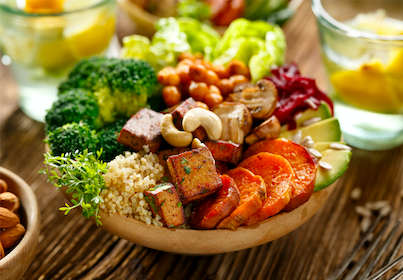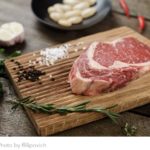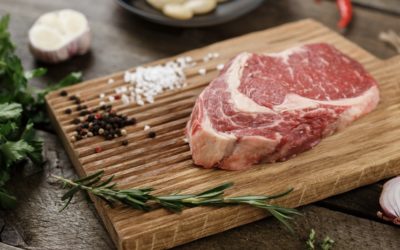The Universe feels totally aligned this week… everyone is focusing on protein. Which leads me to ask the question, “what’s the big deal about protein?”
I was quoted in an article that appeared in Well+Good, an online health and wellness magazine, regarding three myths about vegan protein. You can read the article here. In it, I talk about why protein is such a misnomer.
Where do you get your protein from?
Many people, when they find out I’m vegan, ask me where I get my protein from. My answer is simple, where your protein gets its protein. I don’t say this to be facetious, I really mean it!
Cows and horses don’t eat each other or other animals. They eat grass. And they’re healthier for it! Animals raised “grass-fed” have higher levels of omega-3 fatty acids and less saturated fat (less marbling). These are some of the reasons why functional doctors recommend grass-fed meat.
Maybe we should be asking a different question. Not where do you get your protein, but rather…
What is the quality of your protein?
In an article published in Advances in Nutrition, David Katz et al. propose that the word “quality” doesn’t do justice when it comes to animal protein. They question whether what is considered “high-quality” protein signifies a superior source of food when animal proteins are associated with an increased risk of chronic diseases and pose a “substantial impact” on the environment too. Plant-based proteins and dietary patterns are associated with a lower risk of chronic illness and less impact on the environment.
A better question to ask might be, can a diet containing plant-based proteins be an adequate source of protein for the average American? The answer is yes!
Understanding protein
What is protein? Protein is made from amino acids, building blocks that combine to make various proteins your body needs to function properly. There are 20 amino acids, 11 of which are non-essential and 9 of which are essential. Essential means that you need to obtain it through the foods you eat, non-essential means that given the right substrates your body can make the amino acid on its own.
When you eat protein from any source, as mentioned above, it gets broken down into its smallest building blocks, amino acids. Like a set of dominos before a game, amino acids get shuffled around and picked up for their next job as needed.
Your body can make some amino acids on its own, others have to be consumed through the foods you eat. The amino acids you have to get from food are considered essential amino acids.
Not all proteins are created equal. Some proteins are complete proteins, meaning they contain all 20 amino acids, and some are incomplete, meaning they have some but not all of the amino acids. Examples of complete proteins are animal products and quinoa or tofu. Examples of foods that are incomplete proteins are rice and beans, which are often paired together in meals not just because they taste good, but because they complement each other, and eaten together provide all the amino acids.
For many years it was thought that incomplete proteins needed to be eaten together in the same meal. More recent evidence shows that as long as those foods are eaten in a 24-hour time period, that is sufficient. The challenge is that your body doesn’t store amino acids. They are either used by your body or discarded as nitrogenous waste. Another thing to consider is that eating large amounts of protein, in excess of physiological needs, can put undue stress on the kidneys.
You can actually eat a variety of plant-based proteins each day and the amino acids will be there when and as they are needed, as long as energy needs are met. Your body is miraculous!
How much protein do you need?
A recent study found when you consume 90% of your protein from plant sources, your body’s need for protein is not much more than if you were consuming 90% of your protein from animal sources. In other words, protein is protein, plant-sourced, or animal.
You can be healthy, with adequate protein intake, without sacrificing strength, and not harm another sentient being. Win-win for everyone!
As a matter of fact, several studies in different countries including the US, have found that vegans and vegetarians do consume adequate amounts of protein (and even slightly more). So it would seem, you need less than you think!
The Academy of Nutrition and Dietetics recommends consuming 0.8-1.0 grams per kilogram of body weight. For a person who weighs around 150 lbs that amounts to 55-68 grams of protein per day. As mentioned above, it doesn’t matter if it comes from plants or animals to your body, it doesn’t know the difference. A professional athlete or bodybuilder may need more, and should be assessed individually. For the average individual who exercises 30-60 minutes a day, the general recommendations would be sufficient.
Those who adhere to a plant-based diet are healthier for it.
Again, ample evidence exits supporting the relationship of decreased chronic illnesses like heart disease, diabetes, and obesity and a plant-based diet.
Maybe this is due to the higher quantity of fiber in a plant-based diet, maybe the fact that those eating a plant-based diet consume less fertilizer, pesticides, antibiotics, and other pharmaceuticals as a result of consuming less meat. Plant-based eaters also consume less salt and saturated fatty acids, and more omega-3 fatty acids.
All of this contributes to a decreased risk of all-cause mortality and especially that from heart disease. It also contributes to less strain on the health of the environment.
In conclusion, it might be time to re-evaluate our obsession with getting enough protein and start focusing on getting a better quality of protein for ourselves, those we share the earth with, and the environment that sustains us all.
References
Katz DL, Doughty KN, Geagan K, Jenkins DA, and Gardner CA. Adv Nutr 2019;10:755-764.
Rand, WM, Pellet PL, Young VR. Meta-analysis of nitrogen balance studies for estimating protein requirements in healthy adults. Am J Clin Nutr 2003; 77(1):109-27.
Melina V, Craig W, Levin S. Position of the Academy of Nutrition and Dietetics: vegetarian diets. J Acad Nutr Diet 2016;116(12):1970-80.









